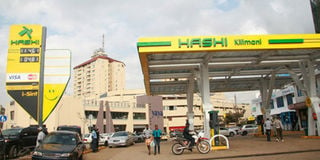
Hashi fuel station in Kilimani, Nairobi
Troubled petroleum dealer Hashi Energy has failed to overturn a Sh7 billion tax demand as assessed by the Kenya Revenue Authority for the period 2017 and 2022.
Tax Appeals Tribunal ruled that the firm, which is facing liquidation, failed to discharge its burden of proof and further failed to file its self–assessment returns for the years 2021 and 2022, and the assessment by KRA was therefore justified.
The tribunal chaired by Robert Mutuma agreed with the taxman that the firm did not table supporting evidence or information to demonstrate that the assessment as issued by KRA was erroneous or in any way excessive.
Further, the tribunal said the firm acknowledged that it did not file the tax returns for the years 2021 and 2022 due to delays in the completion of the annual audits.
“In the circumstances, the Respondent cannot be faulted for using the available information and its best judgement as empowered under Sections 24 (2) and 31 (1) of the Tax Procedures Act,” said the tribunal.
The troubled firm recently announced that it would be selling multiple assets, including parcels of land to pay off its creditors after announcing plans to go into voluntary administration last year.
The decision by KRA will add to the firm’s burden following the dismissal of the tax appeal.
The firm was involved in the sale and distribution of LPG and the provision of food rations and related services to UN stabilisation missions in the Democratic Republic of Congo.
Evidence presented before the tribunal was that KRA carried out an audit on the firm’s business covering corporation tax, withholding tax, VAT, and Pay-as-you-earn (PAYE) for the period 2017 to 2022.
In a letter on June 16, 2023, the KRA demanded a tax of Sh7.1 billion, which the firm objected to.
The parties held several meetings where the petroleum dealer provided some records, which were reviewed by KRA.
After reviewing the documents, the commissioner of domestic taxes revised the amount to Sh7.12 billion and sent an objection letter dated September 7, 2023.
The company faulted the KRA on the assessment although it admitted that it did not file the tax returns for years 2021 and 2022 on the due dates due to delays in the completion of the annual audit.
However, the firm said once the audits were completed, it supplied the KRA with the audited financial statements for the years 2021 and 2022 although the taxman proceeded with the default assessment.
The company said it explained to the KRA through supporting documents and agreements that the food supply business to the UN in DRC was carried out by the holding company, Hashi Energy Holdings (HEHL), hence this is not its income as per Section 3 (1) of the Income Tax Act.
Consequently, the costs relating to HEHL operations in DRC had not been considered as business expenses in the updated books of the firm.
Further, the firm said the income tax assessment of Sh3.85 was based on estimated figures by the assessing team mainly from its DRC Food Ration Business (RBU unit).
Hashi Energy said it provided the revised audit accounts for the period 2019 for review which included segment reports on Food Ration Business (RBU) from DRC and the related costs.
It asserted that the default assessment of Sh1.89 billion for the years 2021 and 2022 was made on estimated figures in total disregard of such income despite its supplying statements which is in contravention of Section 15 (1) of the Income Tax Act.
On the VAT assessment of Sh2.19 billion, the firm said its business mainly consisted of the sale of LPG, transit transport, and supplies made to the UN which were either Exempt or zero-rated supplies as per VAT Act 2013.
Further, in most cases, the zero-rated supplies to UN in DRC were omitted in error in the VAT returns which was the main reason for the variance between sales as per income tax returns and VAT returns.
On the PAYE assessment of Sh242 million, the company said it was based on estimated figures that were obtained from comparing staff costs as per Income tax returns and iTax PAYE returns.
The company maintained that this was erroneous as it did not have employees in DRC that the employees in DRC were for the holding company HEHL and that the expenses included staff medicals, staff uniforms, staff welfare for the Kenya employees, and logistics expenses in DRC which should not have been subjected to PAYE.
KRA opposed the appeal saying a review of the 2017 and 2018 audited financial statements and ledgers established that the company only declared income denied from its Kenyan customers and did not declare the Income from Ration Food Business and UN fuel supply contract which was accrued in or derived from Kenya.
Further, during the period under audit, the company had additional sources of income that had not been declared contrary to Section 3 (1) of the Income Tax Act, including the ration food business and UN fuel supply contract.
On the food ration business, the KRA said the audit established that in the year 2018, Hashi Energy won a contract to supply foodstuff under the ration food contract to the UN peacekeeping missions in the DRC.
This contract entailed the construction of one godown in Mombasa and a “build and transfer” of six go-downs in DRC.
From the interviews held with the firm’s staff in February 2023, the KRA stated that it established that the company would receive a six-month advance food order from UN which was based on the number of staff that were in each base which included Goma, Uvira, Bukavu, Kinshasa, Boni and Bunia.
It stated further that once the order was received, the dealer would procure the food items through its Dubai office and once procured the food items would either be shipped to Goma DRC or to Mombasa for storage before distribution.
The KRA added that the contract required the company to maintain warehouses both in Mombasa and DRC from where the storage and supply of the foodstuff was done.
As for record-keeping, the KRA said it established that the company maintained its financial statements in US Dollars which were in contravention of Section 23 (2) of the Tax Procedures Act (TPA) which provides that the unit of currency shall be in Kenya shillings.
In the decision, the tribunal said the firm not only failed to respond or controvert KRA’s findings but made mere assertions without providing evidence that would persuade the Tribunal.
The tribunal ruled that in tax matters, it is the taxpayer who bears the burden of proof as per Section 56 (1) of TPA, to challenge the KRA’s demand as it is the custodian of the documents and information relating to its business.






